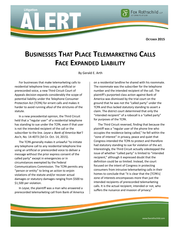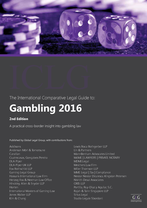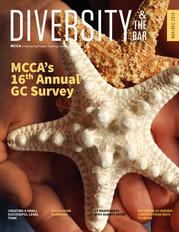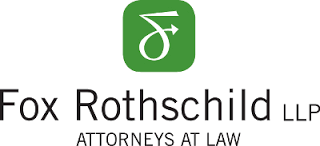Description
Litigation Alert | May 2016
seized must remain in the custody of the court (and
out of the possession of the moving and non-moving
parties) until there is a full court hearing on the
seizure and potential return of property to either
party.
An order entered under the DTSA can also allow
state or local law enforcement officials to participate
in the seizure, but the moving party cannot. Local
officials can also solicit the service of technical
experts (unaffiliated with the moving party) to assist
in the seizure. The court can also appoint a special
master who can facilitate the return of unrelated
property and data that may be seized as part of the
overall seizure. In other words, the DTSA formalizes
and legitimizes a type of self-help trade secret
protection while, at the same time, excluding the
moving party from that process.
By doing so, the moving party avoids allegations by the responding party that the self-help was excessive in some way. By the same respect, the non-moving party can have some level of assurance that the moving party is not going to access the responding party’s own trade secrets in the process and, in fact, will have that unrelated material captured in a seizure returned to the responding party. Beyond injunctive relief, the DTSA provides for the award of damages for any of the following: (1) actual loss caused by the misappropriation; (2) unjust enrichment caused by the misappropriation not otherwise addressed by the actual loss; or (3) a reasonable royalty for the unauthorized disclosure of the trade secret. Exemplary damages of not more than two times the actual loss may be awarded for willful and malicious misappropriation. Although the DTSA provides companies with a hammer to enforce their trade secrets, the DTSA also punishes a party who acts inappropriately in either claiming trade secret protection or infringing with another’s trade secrets. If a claim of misappropriation is made in bad faith, the prevailing responding party is entitled to its reasonable attorney’s fees.
Conversely, the moving prevailing party is entitled to its attorney’s fees where the misappropriation was willful and malicious or where a motion to terminate an injunction is made in bad faith. The DTSA finally provides companies with a federal right and forum in which to protect their trade secrets through injunctive relief, seizures of misappropriated trade secrets and monetary damages. Through the attorney’s fee shifting provision, the DTSA provides companies with a further financial incentive to go after a company that misappropriated trade secrets in bad faith. At the same time, companies must act with caution because pursuing a claim in bad faith could result in you paying your opponent’s attorney’s fees. For more information about this alert, please contact Joshua Horn at 215.299.2184 or jhorn@foxrothschild.com or any member of the firm’s Litigation, Intellectual Property or Corporate Departments. Attorney Advertisement © 2016 Fox Rothschild LLP.
All rights reserved. All content of this publication is the property and copyright of Fox Rothschild LLP and may not be reproduced in any format without prior express permission. Contact marketing@foxrothschild.comfor more information or to seek permission to reproduce content. This publication is intended for general information purposes only.
It does not constitute legal advice. The reader should consult with knowledgeable legal counsel to determine how applicable laws apply to specific facts and situations. This publication is based on the most current information at the time it was written.
Since it is possible that the laws or other circumstances may have changed since publication, please call us to discuss any action you may be considering as a result of reading this publication. www.foxrothschild.com .
By doing so, the moving party avoids allegations by the responding party that the self-help was excessive in some way. By the same respect, the non-moving party can have some level of assurance that the moving party is not going to access the responding party’s own trade secrets in the process and, in fact, will have that unrelated material captured in a seizure returned to the responding party. Beyond injunctive relief, the DTSA provides for the award of damages for any of the following: (1) actual loss caused by the misappropriation; (2) unjust enrichment caused by the misappropriation not otherwise addressed by the actual loss; or (3) a reasonable royalty for the unauthorized disclosure of the trade secret. Exemplary damages of not more than two times the actual loss may be awarded for willful and malicious misappropriation. Although the DTSA provides companies with a hammer to enforce their trade secrets, the DTSA also punishes a party who acts inappropriately in either claiming trade secret protection or infringing with another’s trade secrets. If a claim of misappropriation is made in bad faith, the prevailing responding party is entitled to its reasonable attorney’s fees.
Conversely, the moving prevailing party is entitled to its attorney’s fees where the misappropriation was willful and malicious or where a motion to terminate an injunction is made in bad faith. The DTSA finally provides companies with a federal right and forum in which to protect their trade secrets through injunctive relief, seizures of misappropriated trade secrets and monetary damages. Through the attorney’s fee shifting provision, the DTSA provides companies with a further financial incentive to go after a company that misappropriated trade secrets in bad faith. At the same time, companies must act with caution because pursuing a claim in bad faith could result in you paying your opponent’s attorney’s fees. For more information about this alert, please contact Joshua Horn at 215.299.2184 or jhorn@foxrothschild.com or any member of the firm’s Litigation, Intellectual Property or Corporate Departments. Attorney Advertisement © 2016 Fox Rothschild LLP.
All rights reserved. All content of this publication is the property and copyright of Fox Rothschild LLP and may not be reproduced in any format without prior express permission. Contact marketing@foxrothschild.comfor more information or to seek permission to reproduce content. This publication is intended for general information purposes only.
It does not constitute legal advice. The reader should consult with knowledgeable legal counsel to determine how applicable laws apply to specific facts and situations. This publication is based on the most current information at the time it was written.
Since it is possible that the laws or other circumstances may have changed since publication, please call us to discuss any action you may be considering as a result of reading this publication. www.foxrothschild.com .













